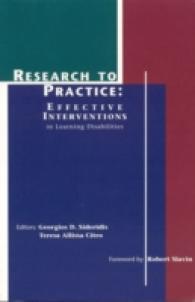Full Description
Co-published with While education abroad - including studying, volunteering, researching, and interning abroad - is increasingly emphasized as a critical factor in preparing undergraduates for a globally interconnected world, diversifying the pool of participants in such activities has proven challenging. Framed within the concept of "inclusive excellence" with the objective of promoting diversity, inclusion, and equity in higher education as foundational to educational excellence, the contributors present research and practices that have been proven successful in improving participation among groups of students traditionally underrepresented in education abroad.Broader participation in education abroad programming has been a perennial concern at numerous higher education institutions in the U.S., having prompted countless discussions in professional organizations and across campuses among faculty, staff, and students. Many have come to recognize that overseas opportunities are no longer a luxury and instead are a necessity for job seekers entering a more diverse, globally interconnected workplace.The volume offers a combination of research-based chapters and case studies from leading experts on the barriers that disproportionately impact specific groups of students, including: students with disabilities; first-generation college students; undocumented students; racial and ethnic minorities; science, technology, engineering, and mathematics (STEM) majors; and males. The authors illuminate the issues which may inhibit education abroad participation, from individual to institutional, and present strategies reflecting a broad range of institutional contexts, resources, and needs.While there has been significant discussion and action to promote broader inclusion in education abroad, this is the first volume focusing on research and practice to achieve these ends, and is intended as a critical resource for practitioners and scholars alike.
Contents
Foreword Esther D. Brimmer Acknowledgments Part O. Framing the Discussion 1. Making the Case for Inclusion in Education Abroad Heather Barclay Hamir and Nick Gozik 2. Underrepresentation in Education Abroad. A Review of Contemporary Research and Future Opportunities Lily Lopez-McGee, David Comp. and Eduardo Contreras Part Two. Research & Practice 3. Students of Color and Study Abroad. From Barriers to Results Jinous Kasravi 4. First-Generation College Students and Study Abroad. Examining the Participation Gap and Successful Strategies for Promoting Access Michelle Tolan and Margaret McCullers 5. There and Back Again. A Study Abroad Journey With Men James M. Lucas 6. Commitments That Work. Removing Barriers for Students wWth Disabilities in Education Abroad Ashley Holben and Monica Malhotra 7. Promoting Education Abroad Among Community College Students. Overcoming Obstacles and Developing Inclusive Practices Rosalind Latiner Raby and Gary M. Rhodes 8. Strategies for Mobilizing Students in the Sciences. A Case Study Lynda Gonzales, Benjamin Flores, and Sarah Simmons 9. Engineers Abroad. Opportunities for Sophomores in International Education Amalia Pérez-Juez and Solomon R. Eisenberg 10. Undocumented Students and Access to Education Abroad Teri Albrecht, Arelis Palacios, and Daniel Siefken Part Three. Next Steps 11. A Way Forward. Exploring Strategies at Multiple Levels Andrew Gordon 12. Expanding the Reach of Education Abroad. Recommendations for Research, Policy, and Practice Heather Barclay Hamir and Nick Gozik Editors and Contributors Index








